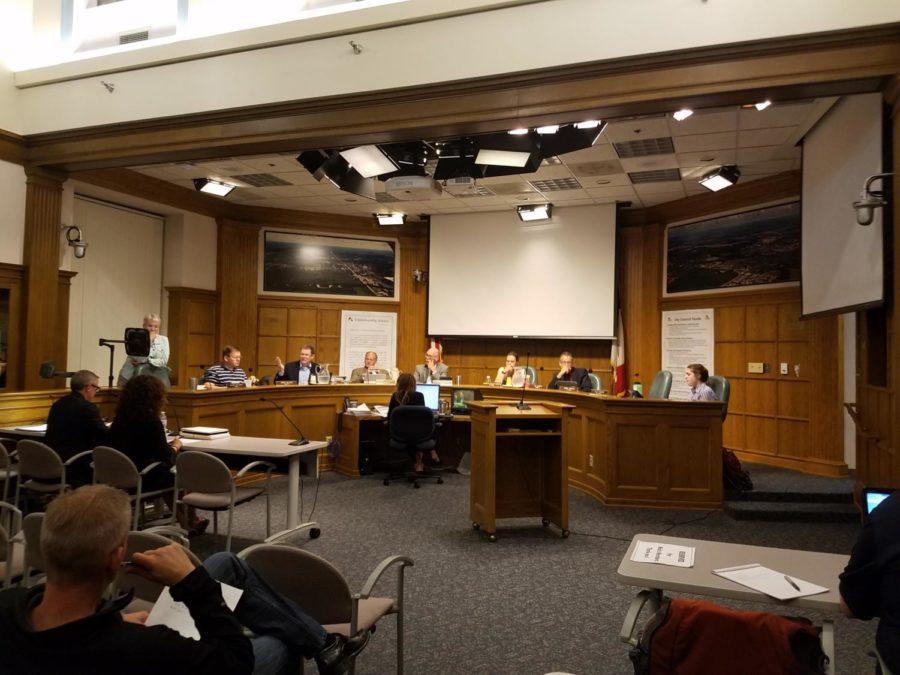- App Content
- App Content / News
- News
- News / Politics And Administration
- News / Politics And Administration / City
City Council looks to modernize discrimination ordinances
City Council discusses Rental Cap exemptions at the June 26 City Council meeting. At-Large representative Amber Corrieri is not present but can speak and vote over the speaker system.
August 21, 2018
Ames City Council discussed guidance for the Ames Human Rights Council (HRC) in relation to its investigations into discriminatory behavior and reevaluating its mission.
The HRC has four main functions — being a watchdog, studying information and analytics, striving for management excellence and working to improve public awareness and effective communication — which were under question during the workshop.
HRC has an extension that investigates legal cases of discrimination. The issue seen from council was the Iowa Civil Rights Commission (ICRC) does the same thing for all criminal discrimination cases. As there are no differences between local and state discrimination law, the ICRC effectively investigates the entirety of discrimination complaints.
“In the opinion of staff, this ICRC arrangement has been a more efficient and effective method to address these complaints compared to investigating them locally,” according to the city council website.
Additional concerns were raised about the HRC training its investigators, uncertainty behind future local ordinances and having those investigators work on a volunteer basis.
“If the City Council believes investigations are an important aspect of the Commission’s work that should be retained locally, an effort would need to be made to appoint volunteer investigators and hearing officers, and then invest resources in training them to handle investigations,” the city council website said.
While the council unanimously decided to remove this investigative branch, they said it would be important to bring the council back in the situation that local discrimination laws change to vary from state law.
“I think this is a good idea,” said David Martin. “I appreciate the point that eventually you may have a mismatch in local ordinances and state law, but that will be the moment we actually know what our new ordinance says.”
Martin said the moment they start making a new ordinance that varies from state laws will be the time for council to reconsider and reimplement the investigation extension of the HRC.
At-Large representative Amber Corrieri said the council could consider taking on a policy the HRC used when she was apart of the HRC. The bias incident report was used for people who wanted to make a complaints related to discriminatory acts that weren’t considered illegal by state or local law. This system kept the investigative extension of the HRC productive but was ultimately dissolved when there were technical difficulties and spam related to the electronic submissions and complaints.
While the council discussed the bias incident reports, there was no action taken.
The council discussed changing the general mission statement and the overlying discrimination ordinance to keep up with modern times.
Reginald Stewart, Iowa State’s Vice President for Diversity and Inclusion, spoke at the council meeting and suggested the HRC modernize itself.
“The commission has been functioning since 1974,” Stewart said. “I think they have to update it. I really think they have a very, very old construct for a much more contemporary set of conversations on diversity, equity and inclusion.”
Stewart mentioned some recent initiatives from Iowa State the HRC could use to influence a new ordinance. He mentioned looking closely at the recent campus climate survey and the efficacy of the campus climate response team.
The campus climate survey was conducted during the fall semester of last year and the results were then released at the beginning of summer. Data in the survey showed some felt they were discriminated on campus: 19 percent of respondents said they had personally experienced exclusionary or intimidating behavior, and 21 percent of those respondents said the behavior was based on their race or ethnicity.
Calling the data from the campus climate survey “fresh off the mill,” Stewart said the data could help suggest a broader climate when making an ordinance.
Ward One representative Gloria Betcher motioned the HRC to review the survey data, equity indexes and all relevant data they could collect to help make recommendation to council for a modernized and comprehensive discrimination ordinance. The motion passed unanimously.
The equity indexes are annual reports from the City of Ames. For example the 2017 index on housing discrimination found there was five reports of housing discrimination. Three of those reports were based on race, one on physical disability and one on mental disability.
















